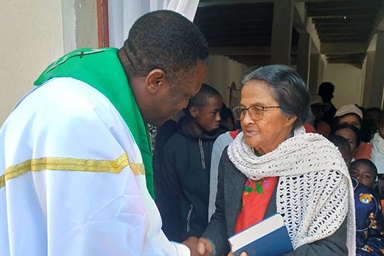Two college students are building an international partnership that they hope will help to fill major gaps in the delivery of primary health care to millions of people on the continent of Africa.
Munyaradzi Chakonda, a freshman business management major at Africa University, and Jon Schulder, a sophomore history major at Yale University, met at Yale in 2017. Both were participating in the Yale Young Global Scholars program. Since then, they have co-founded a company, securing a three-way partnership and startup funding.
Dubbed the “Ubuntu Clinic,” their idea involves the use of micro-franchising to roll out solar-powered mini-clinics in African communities where health care infrastructure is nonexistent, deteriorating or woefully inadequate.
“Ubuntu Clinic,” Chakonda said, “will radically transform the health care industry as we know it today in the region and bring astronomical social value to vulnerable communities.”
Transformation is critical. Millions of Africans suffer and die each year from diseases and in circumstances that are easily treated or prevented. Currently, one in every six children born in sub-Saharan Africa dies before age 5. More than two-thirds of all women who die in childbirth worldwide each year live in the region. Average life expectancy at birth in sub-Saharan Africa is 46 years, compared with 67 in Asia, the region with the world’s second-lowest life expectancy.
Chakonda and Schulder believe the Ubuntu Clinic will successfully address four key challenges that limit access to primary health care in sub-Saharan Africa: geographic availability of facilities, quality and ease of obtaining care, affordability and acceptability, which is understood as having the right equipment and personnel in the right places to meet community needs.
“Our goal is to become a model for the great things that can happen when Americans and Africans partner for good,” said Schulder.
The originality and promise inherent in Ubuntu Clinic’s approach to these challenges attracted support from Africa University and a South Africa-based public-sector project-implementation firm called Global Performance Designs. Now, the three entities are combining their resources to put the Ubuntu Clinic approach to the test.
“Africa University’s contribution takes it beyond the conventional aspects of university education — teaching, learning, research and community service — and into innovation for commercialization, which is pivotal to Africa’s future,” said Sungano Mharakurwa, dean of the college of health and natural sciences.
The central product is a modular clinic, housed in a recycled shipping container and equipped specifically for the needs of each target community. The team estimates that this smaller and technology-driven commercial facility will cost around $10,000 and be a better fit for underserved areas than the traditional government and mission clinics that are too few and far for many communities. They also view the Ubuntu Clinic franchise opportunity as an avenue of self-employment for newly qualified medical doctors. Each clinic would offer primary health care services, including screening and diagnostic tests, and dispense medication.
While the team awaits the delivery of the first container clinic, a grant to Africa University from the a U.S.-based charitable foundation is supporting the collection of baseline data in target communities.
“There is tremendous opportunity in Zimbabwe and much of the African continent to do well while doing good,” Schulder said. “We believe that by partnering Western capital with African entrepreneurs, we can create sustainable businesses that improve the quality of life of (their) customers.”
Health statisticians, information technology personnel and other experts at Global Performance Designs are primarily responsible for health-needs mapping, disease surveillance and tracking changes in public health as they occur.
“The Africa University Clinical Research Center, (CRC), is tasked with best practice implementation, grants management, and using the operational knowledge gained during the pilot phase to develop training, policies and procedures for future franchisees,” said Fadzai Mutseyekwa, the CRC director.
“Micro-franchising offers a market-based and enterprise-led approach to providing much-needed goods and services to low-income communities” said Chakonda. “This is particularly relevant in Africa's health sector where health needs are among the world's greatest. In this context of unmet needs, Ubuntu Clinic aims to achieve a sustainable and scalable model to solve this 'billion people' problem.”
Four high-density, peri-urban communities close to Africa University have already been identified as potential Ubuntu Clinic sites. All four are fast-growing communities, where residents earn solid income but are still desperately underserved.
Ubuntu Clinic, in collaboration with Africa University and Global Performance Designs, will operate under a joint-venture agreement. The implementation team anticipates a yearlong pilot phase to assess the viability and scalability of the initiative. The Ubuntu Clinic business model is key to the success and upscaling of the initiative within and beyond Zimbabwe. Franchisees are expected to pay a one-time franchise fee, remit a percentage of gross sales monthly and receive inventory on an ongoing basis.
Stevens is director of communications for the Africa University Development office and Dunlap-Berg is a freelance writer and editor based in Carbondale, Illinois.
News media contact: Vicki Brown at (615) 742-5470 or [email protected]. To read more United Methodist news, subscribe to the free Daily or Weekly Digests.
Like what you're reading? Support the ministry of UM News! Your support ensures the latest denominational news, dynamic stories and informative articles will continue to connect our global community. Make a tax-deductible donation at ResourceUMC.org/GiveUMCom.




